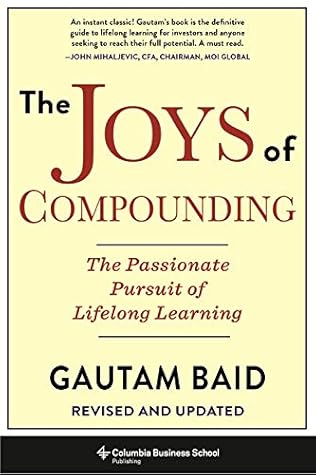More on this book
Community
Kindle Notes & Highlights
by
Gautam Baid
“The big money is not in the buying and selling, but in the waiting.”
If you take the best text in economics by Mankiw, he says intelligent people make decisions based on opportunity costs—in other words, it’s your alternatives that matter. That’s how we make all of our decisions.
In essence, you make your choices, and then your choices make you. Every decision, no matter how slight, alters the trajectory of your life. Every choice’s compound effect is in action all the time. Your life today is a result of your past choices. Hard choices, easy life. Easy choices, hard life.
“Beware of little expenses; a small leak will sink a great ship.”
But consumer preferences can change rapidly and unpredictably. Many business-to-business companies (though not all) face much slower changes in customer preferences, making financial modeling easier.
“Cheap” is a poor proxy for value: the new business models…—SaaS [software as a service] in particular—are not well suited to traditional GAAP [generally accepted accounting principles] accounting. Here’s why: if distribution costs are zero, the optimal strategy is to gain as many customers for your software product, as quickly as possible. In digital businesses, there are increasing advantages to scale, and many of these companies operate in winner-take-all or winner-take-most markets. The name of the game is thus to build, grow, then monetize.
For these SaaS companies, study the incremental unit economics—that is, how much it costs to acquire each customer and how much value they deliver over a span of time—and then analyze what the business margins and cash flows look like at a steady state once the investment phase slows down.
“ABC: Always Be Curious.”
Reversion to the mean says that an event that is not average will be followed by an event that is closer to the average.
In the hands of a good storyteller, almost every stock looks like a winner.
The key to good health lies in three words: moderation, consistency, and sustainability.
What you are is what you have been. What you’ll be is what you do now.
Your thoughts become your words. Your words become your actions. Your actions become your habits. Your habits become your values. Your values become your destiny.”


